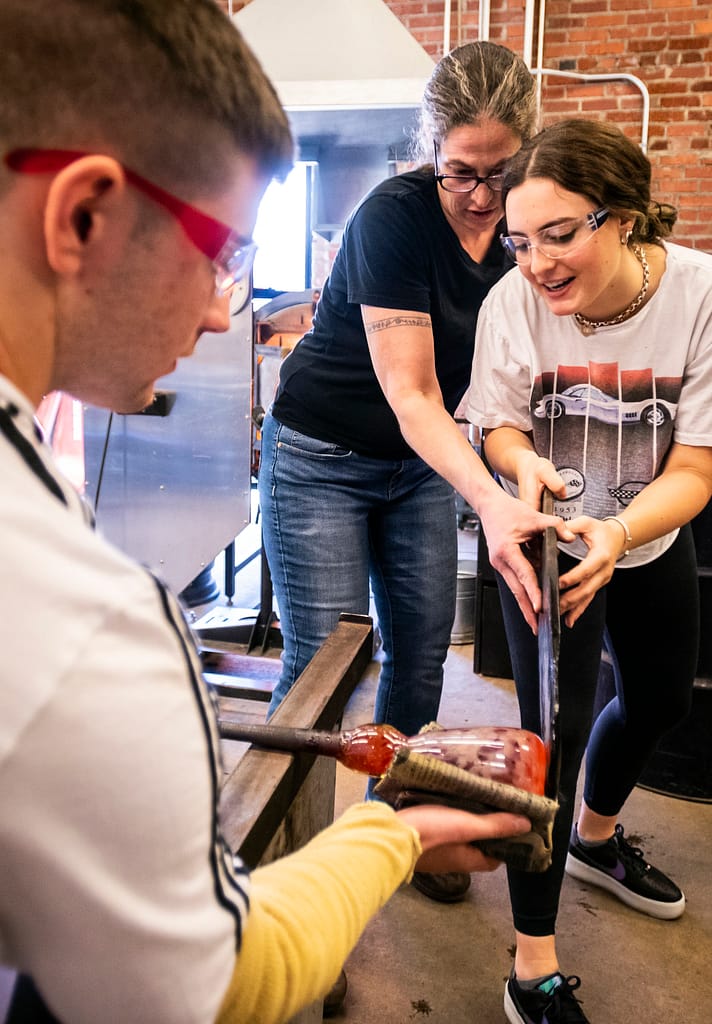The Olio is pleased to introduce our new online newsletter series – The Salmagundi – an exploration of using the arts as a tool for personal and professional development.
Issue #1 – interview with Rebeccah Byer – the Founding Executive Director of The Olio, Co-Founder of Artful Unlimited, Glassblower, Artist, Co-Producer of award-winning documentary feature film Indestructible, past professor of the practice at Wake Forest University in the Center for Entrepreneurship, educator, social entrepreneur, and lifelong apprentice.
What makes a good student of your craft?
There are three distinctive, and equally important to me, facets of my work…..art & glassblowing, education & entrepreneurship, and social entrepreneurship & community development.
With that said, I think it’s the same for all three…
I think the best students are the ones who realize they don’t know a fraction of what is out there to learn, or what they think they know is truly limited to their own experience and learning. Good students also know that everyone learns in their own way, at their own pace, and that you need critical feedback to improve.
Good students are open to fumbling, willing to be vulnerable, and open to learning just about anything if it makes them get better at their craft, gain deeper understanding and perspective, and grow as people overall. Those things will influence the work.
How long before you felt like you had gained proficiency?
How proficient I feel about something depends on the day, my mood, and what exactly we are talking about….
Glassblowing took many years for me to just be mediocre. If I take long breaks, it can take a while for me to get back to where I was before the break, based on how long the break was, but also what I am trying to accomplish. The skills are a lot of muscle memory which will get weak without practice. So I don’t take commissions when I don’t have access to a studio regularly, which happens more often than not. I have been blowing glass for over 30 years off and on, but I feel like my skills are just OK.
Entrepreneurship and community development are also a never-ending learning process, and the answer to almost everything depends on several factors. So, I will never be truly proficient there, but I try to learn and be open to what I don’t know. I also try to collaborate and work as efficiently as possible.
Teaching is the one thing I feel I gained a lot of strength early on. Because I was never interested in teaching in a traditional environment, there was nothing for me to compare myself to, it was hard for me to see things accurately in the beginning.
How would you define being a master of your craft?
There are certainly many masters, in glass, in art, and in entrepreneurship. I tend to gravitate toward the ones who still show an interest in learning, and more importantly, are willing to share what they know with others without fear of competition. Being a true mentor to others shows mastery, to me. Being kind and patient with those who are learning, while still pushing your own growth and interests, shows a unique level of skill.
Can you share a great moment, and a terrible moment, about teaching or learning your craft?
A great moment was recently, when I read through my evaluations from the Wake Forest Center for Entrepreneurship, where I taught for 3 ½ years, and I was able to read them with a new lens. I could see certain comments in a different light, and that was interesting since I am always considering my approach to teaching and learning. And, I saw the negative comments with a much better perspective than I did at the time. I appreciate being able to receive feedback with a critical lens of myself, but also with grace and kindness.
A terrible moment was when I was co-producing Indestructible. I accidentally mailed copies of the movie “Superbad” to several potential distributors, instead of sending them our film. I can’t remember if my brother ever knew about that, or if he was even still alive at the time. I was incredibly embarrassed but had to just suck it up and move on. In hindsight, don’t let other people use your computer, especially if they are up to some things.
Do you have advice for dealing with plateaus or blocks when you are learning?
“Keep pushing on” is typical to hear, and I think that it’s good advice. But also, patience is underrated. Everyone is different, so what feels slow to some may be quite fast to others.
Also, try to get out of your comfort zone to find inspiration. Experiencing things that make us uncomfortable is a great platform for learning.
Be kind, to yourself. And to others…others are excellent sources of inspiration….collaborating can help take someone out of a rut.
Who and where do you find inspiration for your craft?
Artists who create work without care for whether people ‘get it’ or not. They are the ones I truly find interesting, even if the work is not my taste, I respect that approach.
I listen to audiobook memoirs, to get out of my head, and to hear people telling their stories. This inspires me quite a bit.
I also have several creative projects going at a time, in a few mediums, and that helps me to find inspiration in multiple ways, to apply to several purposes. It can feel frenetic to others at times, but it is just the way I am.

